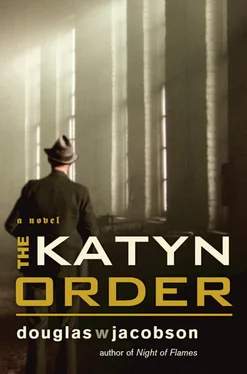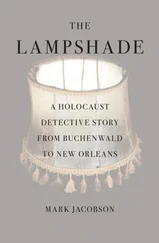When they were alone, Whitehall said, “You’ll be going to Berlin, to join the investigation team and to find out what you can about Ludwik Banach. Of course, we’ll provide you with an entire list of names the Poles are supposedly interested in—to make it seem more logical, you understand.”
“The Russians control Berlin. How are you going to get me in?”
Whitehall leaned back in his chair, which creaked in protest. “A conference is being arranged between Stalin, Churchill and the new American president to implement the Yalta agreements. It will take place at Potsdam, a suburb of Berlin that is still mostly intact. British and American officers are being allowed in to make arrangements.” Whitehall swung around and hoisted himself off the chair, once again indicating the meeting was over. “It’s a frightfully tedious process, but we should be able to get you in. It’ll take a few days to work up the papers. I’ll give you a ring.”
Three days later Adam met Whitehall for dinner in a small, private dining room at the Lion’s Head Pub just down the street from SOE headquarters. It was a smoke-filled, dimly lit place with cracked leather booths and creaky floors. “Is everything set up?” Adam asked when they sat down.
Whitehall was silent as a waiter appeared, delivered two pints of ale and departed. The portly colonel took a sip of ale. “Everything’s in order. I’ve managed to get your U.S. passport renewed and cleared the mission with your State Department. God, they’re a bloody tiresome lot, wanting to know what you’ve been up to the last five years and all that rubbish.” He slid the blue passport across the table.
Adam slipped the passport into his pocket and picked up his glass, though he hated the warm, flat British beer. He’d give anything to plunge his hand into a bucket of icy cold water and pull out a frosty bottle of Budweiser. “So, what did you tell them, Colonel? What’s my cover story?”
“Yes, yes, I’m getting to that. It’s all been worked out. Quite simple actually. Almost everything is exactly the way it really happened. You’re a naturalized American citizen and a former American soldier who was born in Poland. You returned to Poland in ’36, lived with your aunt and uncle in Krakow, and went to law school. When the Germans invaded in ’39, you were deported and came to London—and this is the new part—where you’ve been ever since, working as a liaison between the British Government and the Polish Government-in-Exile.”
Adam took a swallow of beer, grimaced and set the glass down. “So, I’ve been a diplomat for the last five years instead of an assassin.”
Whitehall shrugged. “Bit of a stretch, perhaps, but your State Department bought the story. We threw a lot of paper at them, and they filed it all away.”
“I doubt the Russians will be as easy to fool, Colonel.”
“No, I’m sure they won’t be. And of course that’s the sticky part.
The Russians are very suspicious about the Americans and the British, and vice versa. Tensions are high. Everyone is treading lightly to make sure this conference comes off.”
“Yes, I understand.”
“The Russians, as you know, will not communicate directly with the Poles. That’s why I chose you. But they’ll investigate. Even though you’re an American, and a civilian, the Russians will try to find out everything they can about you. And I don’t have to tell you what their attitude is toward the AK.”
Adam snorted. “Their attitude is to wipe out the AK. But it’s a little late to worry about that now, isn’t it?”
“It’s never too late to change plans. What I want to know is, are you sure the Russians don’t know who you are? Are you sure they don’t know the name Adam Nowak?”
Adam set his glass down. “I haven’t used that name in six years.” The mention of his name to Natalia in the ammunition cellar flitted through Adam’s mind, but he ignored it. “I haven’t used it since the day I arrived in Antwerp in November of ’39 and telephoned you. I was nobody then, a former student who’d been doing research for his uncle, and I was being deported from the country. And Poland has been in chaos ever since.” He paused, glancing around the small dining room, making sure they were alone. “If the Russians knew who I was, Colonel, I wouldn’t be here. I’m exactly what your people trained me to be: dark and silent.”
Whitehall beamed. “Well then, Adam Nowak is back.”
The food arrived: baked fish and cold vegetables. They both picked at it with little enthusiasm. After a while, Whitehall wiped his mouth and dropped the napkin on top of his plate, obviously eager to get on with the business at hand. “The Russians will go through the motions at the Potsdam conference, but we doubt they have any intention of allowing free elections in Poland,” he said. “According to our intelligence, they’re organizing a group of Polish communists in Lublin as the new government.”
“I know about those bastards,” Adam said. “They’re puppets, dancing on strings for Stalin.” He folded his hands on the table, clenching his fingers so tightly his knuckles turned white, thinking about the Russian general, Kovalenko, who lied to him, then watched Warsaw burn. He thought about Natalia and her family in the small village near Lwow, and her brother, the cavalry officer captured and murdered by the Russians.
“I know what the Russians are capable of,” Adam hissed. “They’re worse than the Germans. They proved that back in 1940 when they murdered thousands of Polish officers in cold blood in the Katyn Forest.”
Whitehall grunted and flicked his hand in the air as if dismissing an old myth.
Adam swallowed a gulp of the warm, flat ale and set the glass hard on the table, glaring at Whitehall. “I know the Russians claim the Germans committed the massacre at Katyn, Colonel. And the British and Americans are buying the story. After all, the Russians are our allies. I understand the risk. Now, when do I leave?”
16 MAY
THE U.S. ARMY TRANSPORT PLANE banked to the left as it began its final approach into Berlin’s Templehof aerodrome. Adam looked out the window to catch a glimpse of the city, but the view was obscured by a thin veil of fog.
The American Air Corps officer sitting next to him leaned over and tapped the window. “That’s dust,” he said.
“Dust?”
The officer nodded. “I’ll bet you thought it was fog. I thought so, too, when I flew in here last week. It’s dust from all the collapsed buildings. The heat from the fires carries the dust into the air. The whole city’s covered with it—what’s left of it, anyway.”
As they dropped in altitude, snatches of the ground became visible, and Adam turned back to the window. Images emerged through the dust, spreading out in all directions in a brownish-gray monochrome, images that reminded him of pictures he’d seen of the ruins of ancient Rome… images that reminded him of Warsaw.
Adam leaned back in the seat and closed his eyes, a jumble of emotions racing through him. For the first time in many years he was back in the company of American soldiers. But these soldiers were different from those he served with in the thirties, during the ambivalence of a peacetime army. In those days he’d worked at his sharpshooting and sniper training with relish because he enjoyed it, but there was always the undercurrent that it really didn’t matter because America was at peace and unconcerned about political tensions half a world away. But the soldiers sitting around him now were different. They had a strong, confident edge, and the battle-hardened swagger of soldiers who had just won a war. He’d fought the same war, though he fought it differently and perhaps for different reasons. All the same, he was pleased to be in their company.
Читать дальше












